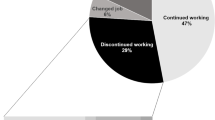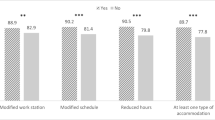Abstract
Purpose
A considerable proportion of individuals who are diagnosed with cancer are at a working age. We aimed to gain an in-depth understanding of the challenges, and arising needs related to working after cancer in a setting with limited employment protection policies.
Methods
Focus group discussions were conducted with cancer patients who were diagnosed at least 1 year prior to recruitment, and either had paid work, were self-employed, currently unemployed, or currently retired (N = 66).
Results
Three main themes were identified: (1) loss of income: While some participants were entitled for a 1-year cancer-specific sick leave, many other participants recounted having insufficient paid sick leave, forcing them to take prolonged unpaid leave to complete treatment; (2) dealing with side effects of cancer and its treatment: The need for workplace accommodations was highlighted including flexible working hours, lighter workloads, and dedicated rest areas to enable patients to cope better; (3) Discrimination and stigma at workplace: Some participants mentioned being passed over on a promotion, getting demoted, or being forced to resign once their cancer diagnosis was disclosed, highlighting an urgent need to destigmatize cancer in the workplace.
Conclusion
In settings with limited employment protection policies, a cancer diagnosis severely impacts the working experiences of patients, leading to financial loss. Urgent interventions and legislative reforms are needed in these settings to address the unmet employment needs of cancer survivors.
Implications for Cancer Survivors
This study may facilitate planning of local solutions to fulfill the unmet employment needs following cancer, such as return-to-work navigation services.
Similar content being viewed by others
References
Allemani C, Matsuda T, Di Carlo V, et al. Global surveillance of trends in cancer survival 2000-14 (CONCORD-3): analysis of individual records for 37 513 025 patients diagnosed with one of 18 cancers from 322 population-based registries in 71 countries. Lancet. 2018;391(10125):1023–75.
Miller KD, Nogueira L, Mariotto AB, Rowland JH, Yabroff KR, Alfano CM, et al. Cancer treatment and survivorship statistics, 2019. CA Cancer J Clin. 2019;69(5):363–85.
Maddams J, Utley M, Møller H. Projections of cancer prevalence in the United Kingdom, 2010-2040. Br J Cancer. 2012;107(7):1195–202.
Sankaranarayanan R, Swaminathan R, Jayant K, Brenner H. An overview of cancer survival in Africa, Asia, the Caribbean and Central America: the case for investment in cancer health services. IARC Sci Publ. 2011;162:257–91.
Kehm RD, Yang W, Tehranifar P, Terry MB. 40 years of change in age- and stage-specific cancer incidence rates in US women and men. JNCI Cancer Spectr. 2019;3(3):pkz038.
Mehnert A. Employment and work-related issues in cancer survivors. Crit Rev Oncol Hematol. 2011;77(2):109–30.
de Boer AG, Taskila T, Ojajärvi A, van Dijk FJ, Verbeek JH. Cancer survivors and unemployment: a meta-analysis and meta-regression. JAMA. 2009;301(7):753–62.
Alleaume C, Bendiane MK, Peretti-Watel P, Bouhnik AD. Inequality in income change among cancer survivors five years after diagnosis: evidence from a French national survey. PLoS One. 2019;14(10):e0222832.
Kong YC, Wong LP, Ng CW, Taib NA, Bhoo-Pathy NT, Yusof MM, et al. Understanding the financial needs following diagnosis of breast cancer in a setting with universal health coverage. Oncologist. 2020;25(6):497–504.
Timperi AW, Ergas IJ, Rehkopf DH, Roh JM, Kwan ML, Kushi LH. Employment status and quality of life in recently diagnosed breast cancer survivors. Psychooncology. 2013;22(6):1411–20.
de Rijk A, Amir Z, Cohen M, Furlan T, Godderis L, Knezevic B, et al. The challenge of return to work in workers with cancer: employer priorities despite variation in social policies related to work and health. J Cancer Surviv. 2020;14(2):188–99.
Government of Malaysia. Laws of Malaysia Act 265 Employment Act 1955. Available at http://www.agc.gov.my/agcportal/uploads/files/Publications/LOM/EN/Act%20265%20-%20Employment%20Act%201955.pdf . Accessed 17 Jun 2020.
Government of Canada. EI sickness benefits: what these benefits offer [webpage]. Government of Canada; 2020. [Available at https://www.canada.ca/en/services/benefits/ei/ei-sickness.html.] Accessed 11 Aug 2020.
Directorate-General for Employment, Social Affairs and Inclusion. Netherlands - Sick pay and benefits in the event of illness [Webpage]. European Commission; 2020 [Available from: https://ec.europa.eu/social/main.jsp?catId=1122&langId=en&intPageId=4992.] Accessed 20 Jul 2020.
de Boer AG, Verbeek JH, Spelten ER, et al. Work ability and return-to-work in cancer patients. Br J Cancer. 2008;98(8):1342–7.
Calvio L, Peugeot M, Bruns GL, Todd BL, Feuerstein M. Measures of cognitive function and work in occupationally active breast cancer survivors. J Occup Environ Med. 2010;52(2):219–27.
Lavigne JE, Griggs JJ, Tu XM, Lerner DJ. Hot flashes, fatigue, treatment exposures and work productivity in breast cancer survivors. J Cancer Surviv. 2008;2(4):296–302.
American Cancer Society. Americans With Disabilities Act: information for people facing cancer: American Cancer Society; 2020 [Available from: https://www.cancer.org/treatment/finding-and-paying-for-treatment/understanding-health-insurance/health-insurance-laws/americans-with-disabilities-act.html.] Accessed 20 Jul 2020.
Alleaume C, Paraponaris A, Bendiane MK, Peretti-Watel P, Bouhnik AD. The positive effect of workplace accommodations on the continued employment of cancer survivors five years after diagnosis. Support Care Cancer. 2020;28(9):4435–43.
Neumark D, Bradley CJ, Henry M, Dahman B. Work continuation while treated for breast cancer: the role of workplace accommodations. Ind Labor Relat Rev. 2015;68(4):916–54.
Sun W, Chen K, Terhaar A, Wiegmann DA, Heidrich SM, Tevaarwerk AJ, et al. Work-related barriers, facilitators, and strategies of breast cancer survivors working during curative treatment. Work. 2016;55(4):783–95.
Stergiou-Kita M, Pritlove C, Kirsh B. The “Big C”-stigma, cancer, and workplace discrimination. J Cancer Surviv. 2016;10(6):1035–50.
Leslie M, Strauser DR, McMahon B, Greco C, Rumrill PD Jr. The workplace discrimination experiences of individuals with cancer in the Americans with Disabilities Act Amendments Act Era. J Occup Rehabil. 2020 Mar;30(1):115–24.
Park JH, Park JH, Kim SG, Lee KS, Hahm MI. Changes in employment status and experience of discrimination among cancer patients: findings from a nationwide survey in Korea. Psychooncology. 2010 Dec;19(12):1303–12.
Moskowitz MC, Todd BL, Chen R, Feuerstein M. Function and friction at work: a multidimensional analysis of work outcomes in cancer survivors. J Cancer Surviv. 2014;8(2):173–82.
Greidanus MA, de Boer AGEM, de Rijk AE, Tiedtke CM, Dierckx de Casterlé B, Frings-Dresen MHW, et al. Perceived employer-related barriers and facilitators for work participation of cancer survivors: a systematic review of employers' and survivors' perspectives. Psychooncology. 2018;27(3):725–33.
Tiedtke CM. Dierckx de Casterlé B, Frings-Dresen MHW, et al. Employers’ experience of employees with cancer: trajectories of complex communication. J Cancer Surviv. 2017;11(5):562–77.
Feuerstein M, Gehrke AK, McMahon BT, McMahon MC. Challenges persist under Americans With Disabilities Act Amendments Act: how can oncology providers help? J Oncol Pract. 2017;13(6):e543–51.
Tangka FK, Trogdon JG, Nwaise I, Ekwueme DU, Guy GP Jr, Orenstein D. State-level estimates of cancer-related absenteeism costs. J Occup Environ Med. 2013;55(9):1015–20.
Hanly P, Pearce A, Sharp L. Cancer and productivity loss in the Irish economy: an employer’s perspective. Ir J Manag. 2017;36(1):5–20.
Funding
This study was supported through an unrestricted educational grant from PhAMA (Pharmaceutical Association of Malaysia).
Author information
Authors and Affiliations
Contributions
Yek-Ching Kong: conceptualization, data curation, formal analysis, data interpretation, and writing—review and editing. Negina Rauf: formal analysis, data interpretation, and writing—review and editing. Shridevi Subramaniam: data curation and writing—review and editing. Ros Suzanna Bustamam: data curation and writing—review and editing. Li-Ping Wong: formal analysis, data interpretation, and writing—review and editing. Gwo-Fuang Ho: data curation and writing—review and editing. Hafizah Zaharah: data curation and writing—review and editing. Matin Mellor: data curation and writing—review and editing. Cheng-Har Yip: data curation and writing—review and editing. Nirmala Bhoo-Pathy: conceptualization, funding acquisition, formal analysis, data interpretation, and writing—review and editing.
Corresponding author
Ethics declarations
Ethical approvals were obtained from the Medical Research and Ethics Committee (NMRR-16-2054-32802), University Malaya Medical Centre Medical Ethics Committee (2016105-4324), and Subang Jaya Medical Centre (201711.2).
Conflict of interest
The authors declare that they have no conflicts of interest.
Disclaimer
The funder had no role in the design of the study, data collection and analysis, preparation of the manuscript, or decision to publish.
Additional information
Publisher’s note
Springer Nature remains neutral with regard to jurisdictional claims in published maps and institutional affiliations.
Rights and permissions
About this article
Cite this article
Kong, YC., Rauf, N., Subramaniam, S. et al. Working after cancer: in-depth perspectives from a setting with limited employment protection policies. J Cancer Surviv 15, 706–712 (2021). https://doi.org/10.1007/s11764-020-00962-z
Received:
Accepted:
Published:
Issue Date:
DOI: https://doi.org/10.1007/s11764-020-00962-z




